#pos ecommerce integration
Explore tagged Tumblr posts
Text
This article investigates the importance of these systems for the B2B relationships and the nature of these interfaces and platform-specific systems, together with key challenges during their development.
#pos integration#amazon integration#lightspeed integration#lightspeed pos integration#square pos integration#shopify integration#pos ecommerce integration#loyverse pos integration#zoho inventory integration#bigcommerce integration
0 notes
Text
Transforming a Fishing Accessories Store in Seattle, WA
A fishing accessories store in Seattle was facing significant challenges in managing its inventory and sales across its physical and online channels. The store offered a wide range of products, from fishing rods to tackle boxes, but the lack of integration between its Retail Pro PRISM POS and Shopify ecommerce platform was causing inventory discrepancies and delayed order processing.
The store decided to implement Octopus Bridge from 24SevenCommerce to integrate its POS and ecommerce systems. The near real-time synchronization provided by Octopus Bridge ensured that inventory levels were always accurate, regardless of where the sale occurred.
This integration not only improved inventory accuracy but also streamlined the order fulfillment process. Online orders were instantly sent to the appropriate store location for processing, reducing delays and improving customer satisfaction. The store could also manage returns and exchanges more efficiently, further enhancing the customer experience.
The integrated system provided valuable sales data, allowing the store to identify popular products and adjust its inventory accordingly. This data-driven approach enabled the store to optimize its stock levels and reduce overstock and out-of-stock situations.
As a result of these improvements, the fishing accessories store saw a significant increase in online sales and overall customer satisfaction. The efficient and seamless integration provided by Octopus Bridge allowed the store to focus on what it did best: providing high-quality fishing gear and excellent customer service to the angling community of Seattle.
0 notes
Text
Key Insights for Optimizing BigCommerce and Lightspeed Integration
In today’s fast-paced retail landscape, streamlining e-commerce and in-store operations is essential for business success. For businesses using both Lightspeed POS and BigCommerce, integrating these two powerful platforms can help bridge the gap between online and offline operations, offering seamless inventory management, order processing, and customer engagement. Effective integration of…
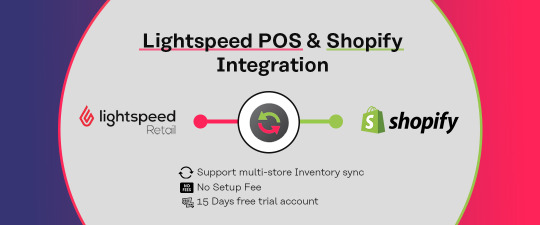
View On WordPress
#Bigcommerce Integration#eCommerce Integration#eCommerce POS integration#Lightspeed and Bigcommerce Integration#Lightspeed Bigcommerce Integration#Lightspeed Integration#Lightspeed Integration with Bigcommerce
0 notes
Text
Get custom Shopify API integration services
Boost eCommerce sales with custom Shopify API integration services expertly crafted to streamline operations and enhance customer experience.
custom shopify api integration services, custom shopify api integration solutions, shopify pos integration services, shopify payment gateway integration service, shopify erp integration services, social media integration services, pim integrations services, shopify integration for chatgpt, shopify integration company, how can i integrate my shopify app
#ShopifyAPI#EcommerceSolutions#CustomIntegration#ShopifyAPIIntegration#EcommerceDevelopment#CustomShopifySolutions#CustomEcommerceSolutions#ShopifyDevelopment#APIIntegration#EcommerceExpertise#ShopifyExperts#CustomShopifyAPI#EcommerceIntegration#ShopifySolutions#CustomShopifyAPIIntegrationServices#HireCustomShopifyAPIintegrationServices#CustomShopifyAPIIntegrationServiceCost#YouTube#art#landscape art#digital illustration#digital sketch#digital drawing#digital painting#digital art
2 notes
·
View notes
Text
Discover Hike POS, the ultimate retail point-of-sale solution designed for modern businesses. From inventory management and real-time reporting to multi-store operations and eCommerce integration, Hike simplifies your retail operations. Compatible with any device, including iPads, PCs, and Macs, it lets you sell anywhere and manage everything effortlessly. With features like centralized inventory sync, staff access controls, and powerful analytics, Hike POS empowers businesses like coffee shops, clothing stores, food trucks, and more. Streamline your retail experience with Hike today!
#pos#Hikepos#POS system#Retail pos#POS software#Retail business#In store pos#Multi store pos#Hike#business#software#inventory#inventory management
2 notes
·
View notes
Text
Migrating Product Data from PrestaShop to Shopify: Best Practices
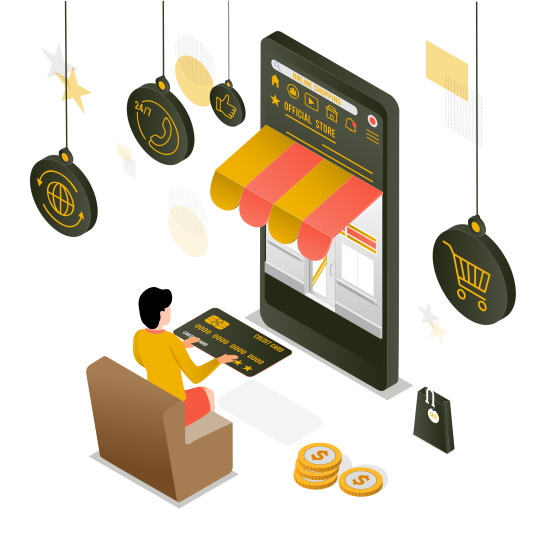
Moving your eCommerce store from PrestaShop to Shopify can be a game-changer, but the success of the migration depends heavily on how you handle your product data. Ensuring that your products, descriptions, and SEO data are migrated without loss is essential. This blog will walk you through the best practices for migrating product data from PrestaShop to Shopify.
1. Pre-Migration Checklist
Backup your entire PrestaShop store, including product data, customer information, and order history.
Analyze your data to remove outdated or irrelevant information.
Make a list of all product categories, attributes, and variants.
2. Choosing the Right Migration Tool
Use automated migration tools like LitExtension or Cart2Cart for seamless transfers.
Evaluate Shopify's native import tools for small to medium-sized catalogs.
Consider hiring a professional migration service for large or complex stores.
3. Preparing Your Product Data
Organize your data into a structured CSV file that matches Shopify’s import format.
Clean up product titles, descriptions, and SKUs for consistency.
Ensure all images are appropriately named and optimized for SEO.
4. Mapping Product Categories and Attributes
Shopify and PrestaShop may handle product categories and attributes differently.
Map PrestaShop’s product categories to Shopify’s collections to ensure consistency.
Double-check that product attributes (such as size, color, etc.) are transferred correctly.
5. Migrating SEO Data
Migrate SEO metadata like meta titles, descriptions, and URLs to avoid losing organic traffic.
Use a URL redirect app to manage old PrestaShop URLs that no longer work in Shopify.
Install SEO apps on Shopify to monitor and optimize your store’s SEO post-migration.
6. Testing Your Product Data Post-Migration
After migrating, thoroughly test your products on Shopify.
Verify that all product variants, descriptions, and images display correctly.
Ensure pricing, inventory levels, and SKU numbers are accurate.
7. Handling Advanced Product Options
Shopify’s product option system may differ from PrestaShop’s.
For products with complex configurations, use Shopify apps like Infinite Options.
Ensure that any product customization data is correctly migrated.
8. Optimizing Your Product Pages
After migration, take the opportunity to improve your product pages.
Use Shopify’s easy-to-customize product templates to enhance the layout.
Consider adding customer reviews or enhanced images for better conversion.
9. Maintaining Inventory Accuracy
Double-check inventory levels before and after migration to avoid stock issues.
Sync inventory with Shopify’s POS or third-party inventory management systems.
Monitor inventory closely post-migration to address any discrepancies quickly.
Conclusion
Migrating product data from PrestaShop to Shopify requires careful planning and execution. By following these best practices, you can ensure a smooth transition that retains the quality and integrity of your product data, setting your Shopify store up for success.
Click here to know prestashop-vs-shopify-feature-comparison-to-help!!
2 notes
·
View notes
Text
The must have ecommerce integrations for your business
World has started moving away from the lockdown phase. The pandemic has done no good to anyone except for the ecommerce industry. With the increased demand for contactless payments, people have started buying things online now more than ever. This is the right time for etailers to grab opportunities for growth and start selling products online in all the available digital channels. While planning for perfection is under continuous debate in an ecommerce world, online sellers still need different ecommerce integrations to run their business.
As an ecommerce seller, you must have known how daunting it is to manage orders on different storefronts and marketplaces tied up with various courier partners, accounting systems, and so on. This is where ecommerce integrations step in to integrate your business with utilized CRMs, Marketplaces, shipping and fulfillment, warehousing, etc.. By automating the key functions of your business, these integrations can help you squarely focus on your business growth rather than just managing all the platforms.
Read on to learn the best integrations for your business and their impact on business efficiency.
Shipping and Fulfillment Integrations
Ecommerce fulfillment is the process of sending orders to your customers. It involves the entire product delivery cycle once the products enter a warehouse, from storing them to picking, packing, and then shipping them to your customers. A renowned fulfillment partner can help you successfully handle all business fluctuations based on your purchase of storage and security equipment, insurance, and more. With the fulfillment partners handling your complex order processing, you, as an ecommerce seller, can focus on what's more important for your business.
CRM Integrations
A CRM is a customer relationship management software that helps any business to monitor, measure and analyze its relationship with its customers. It helps you understand customer behavior across various digital channels by auto-capturing the data from all the lead engines and thus also helping a company to get into marketing automation based on customer interaction and expectations. Thus, a CRM ecommerce integration for your ecommerce business will help you offer better customer service, increased sales, improved customer retention, detailed analytics, efficiency, and so on.
Accounting Integrations
Every ecommerce business would need accounting e-commerce integrations that can help them with payroll, bookkeeping, purchase-and-sales charts, budgeting, profit-and-loss charts, cash flow statements, and so on. Dealing with bulk invoices, profit loss, unclear tax laws, payroll, and several financial aspects. The benefits of accounting automation in ecommerce also extend to appropriate resource allocation and understanding income statements, cash flow statements, and balance sheets.
Marketplace Integrations
If you are getting orders from multiple marketplaces, it's a sure sign of growth for your business. Having said that, this also welcomes an increased challenge of bulk data upload, invoices, product labeling, updating inventory, and so on with numerous orders that you receive from numerous marketplaces. Thus, getting an ecommerce solution that offers multiple marketplace ecommerce integrations for your business is important. This can reduce the manual selling process, boost inventory visibility, and ultimately offer a unified view of your orders under one dashboard.
POS Integrations
If you are an omnichannel seller, POS integration is a must for your business as it helps you easily handle all your online and offline orders and transactions. Not just this, a POS ecommerce integration also helps you to get rid of manually inputting the data, enabling the creation of promotions across multiple channels, enhancing the customer experience, etc..
To Summarize:
Marketplace ecommerce integrations can help you give you a unified view of offline and online sales channels under one dashboard. With real-time updates on your order distribution across multiple channels, you will now be able to concentrate on more critical components of your business.
3 notes
·
View notes
Text
POS for eCommerce: Power to Boost Your Online Sales
Introduction
In today's digital era, having an efficient POS for eCommerce is essential for seamless transactions and improved customer experience.
Whether you're running an online store, a retail business, or a restaurant, a reliable POS billing system ensures hassle-free operations.
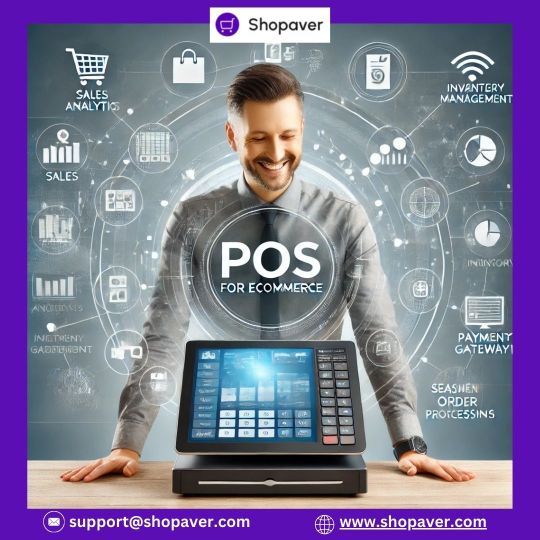
What is a POS for eCommerce? 🤔
A POS (Point of Sale) system for eCommerce is cloud-based software that integrates with your online store to manage sales, inventory, and payments efficiently.
Unlike traditional POS machines, modern online POS systems work in real-time, providing businesses with better control over transactions.
Benefits of Using an Online POS System for Retail 🏪
1️⃣ Seamless Integration: Connects with eCommerce platforms for smooth order processing.
2️. Real-time Inventory Management: Keeps stock updated across multiple channels.
3️. Multi-Payment Support: Accepts credit cards, UPI, and mobile wallets.
4️. Automated Reports & Analytics: Provides insights to improve sales.
5️. Scalability: Suitable for small and large businesses.
Best Online POS System for Your Business 🏆
Choosing the best online POS system depends on your business type:
Retail POS 🏬: Ideal for physical stores selling products.
Restaurant POS 🍽️: Perfect for food businesses with table management and billing.
Mobile POS 📱: Allows transactions on the go for pop-up stores and events.
Conclusion
A POS for eCommerce is a game-changer for businesses looking to enhance efficiency and boost sales. Whether you need a retail POS, restaurant POS, or a mobile POS, investing in the right POS solution can drive growth and improve customer satisfaction.
0 notes
Photo

Mainstream Payment Integration Introducing our cutting-edge custom development service, designed to seamlessly integrate stablecoin-based payments into a wide range of applications. With our expertise, businesses can now harness the power of stablecoin as a reliable medium of exchange, revolutionizing the way transactions are conducted. Imagine the possibilities when stablecoin-based payments are seamlessly integrated into your eCommerce platform. Say goodbye to the volatility and uncertainty associated with traditional cryptocurrencies, as stablecoins offer a stable value pegged to a trusted asset. This means that your customers can make purchases with confidence, knowing that the value of their stablecoin will remain consistent throughout the transaction process. But it doesn't stop there. Our custom development service also extends to retail point-of-sale (POS) systems, allowing businesses to accept stablecoin payments in physical stores. By integrating stablecoin https://millysoft.com/product/mainstream-payment-integration/?utm_source=tumblr&utm_medium=social&utm_campaign=STARTERKITS
0 notes
Text
It’s no secret that mobile technology has changed our way of life in countless ways. Today’s smartphones and tablets are portable computers that are powerful enough to be used reliably in business settings, and many tech-savvy businesses are choosing to implement them in their point-of-sale systems. Being able to facilitate transactions with a mobile device has many benefits that standard computer-based POS terminals simply can’t rival. Why Mobile POS Is Taking Over Integrating mobile devices into a POS system is a huge leap forward, especially for restaurants and brick-and-mortar retailers. For example, a waiter can take one table’s order, send it to the kitchen, and then move right along to the next table. As you can imagine, this makes the day run smoother and more efficiently. When the table has completed their meal, a quick swipe on the mobile credit card reader and they are out the door. In a retail setting, employees on the sales floor can ring up a purchase from anywhere in the store, eliminating that long walk to the cash register that gives customers time to second-guess their purchase. Essentially, a mobile POS system allows a business to run much more fluidly, which in turn boosts customer satisfaction and turnover. Mobile POS simplifies things, reduces error, and allows employees to focus on providing the best service possible. Keeping the Technology Accessible As with any technology, there are good options and there are bad options. It’s important to keep in mind that not every employee is going to be technically proficient, so you must choose a mobile POS platform that is user-friendly, without compromising essential features. Be sure to do some research before you invest in mobile POS technology, as not all options are equal. Elegant POS Solutions As you consider upgrading your POS system, functionality is key. However, you should not discount the level of sophistication this shift brings to a business. Customers notice things like using an iPad or smartphone with a mobile card reader, and they are going to take note, whether subconsciously or deliberately. When you integrate the latest technology in your business, it shows that your company is a modern, evolving entity – a step up from the competition. A More Affordable Option For many small businesses, a mobile POS system is a no-brainer due to its cost. This is especially true for brand new companies that are buying a first POS system. The price difference between standard POS terminals and an integrated mobile solution is staggering – often in the $10,000 range or more. Few start-ups have an extra ten grand to throw around, especially for technology that is quickly going the way of the land line. Seamless eCommerce Integration Many of today’s brick-and-mortar retailers make the majority of their revenue online. In order to remain relevant, many stores are finding new ways to blend online and in-store shopping. For example, a customer may go to a retailer’s website at home, and order a product to be picked up locally. When the customer arrives, an employee can easily bring up that sale and ring up the customer with no hassle involved. This allows the customer to purchase an item online without waiting for shipping. Many modern retail/ecommerce businesses are also experimenting with digital kiosks for stock checking and ordering. Some companies are even making their entire inventory available on in-store iPads, allowing customers to browse comfortably from one location, rather than spending time rummaging through the store. This saves floor space and gives the store a cleaner look, and it also makes tracking inventory a breeze. Conclusion At the end of the day, every business has its own unique hurdles to overcome. If your business needs a POS upgrade, now is the time to get on board with mobile technology. The benefits are clear, the price is right, and customers always appreciate a streamlined, modern shopping or dining experience. Do some preliminary
research, and find the mobile POS solutions that are going to work for your company’s specific needs. The results can be monumental. John Paul West is a technophile from Seattle, WA who writes for Table Talk Tech and other high-tech resources. He is a freelancer of many trades, including writing, programming, web design, and graphic design. When he’s not in front of a screen, John enjoys hiking, reading, and playing the cello.
0 notes
Text
youtube
Ready to make your POS the heartbeat of your online business? In this video, we'll show you exactly how connecting your POS system with your eCommerce platforms can boost efficiency, eliminate manual processes, and create a seamless customer experience! Discover how to sync inventory, orders, and customer data effortlessly across all channels. Don’t miss out on this game-changing setup for your business!
0 notes
Text
Elevate Your Multi-Location Retail Game with Octopus Bridge!

Unlock the potential of your physical stores by seamlessly integrating multi-location Lightspeed POS with e-commerce through Octopus Bridge! Showcase near real-time stock availability on your website, turning it into a dynamic marketing tool that drives foot traffic and boosts sales.
Highlights: Multi-store Lightspeed POS IntegrationNear Real-time Stock Display on Your Website Increase Foot Traffic & Boost Sales
Cloud-Based Efficiency for Modern Retail
Buy Online, Pickup in Store (BOPIS) Support for Ultimate ConvenienceJoin the future of retail with Octopus Bridge – the middleware connector that enhances customer confidence and optimizes your online and in-store experiences. Stand out in the digital age, cater to evolving buyer habits, and seamlessly integrate with leading shopping carts and marketplaces.
Don't miss out on the retail revolution! Elevate your business with Octopus Bridge by 24Seven Commerce.
Visit us at www.24sevencommerce.com/octopus-bridge to learn more!
Continue Reading...
0 notes
Text
eCommerce POS Integrations to Grow Your Online Business
Connecting your point of sale to your online store is crucial to the success of an online business. Because consumers shop around different platforms online before deciding on a product to purchase. So, the more touch points you can make with your prospects, the more likely they are to buy from you. Allowing your POS to synchronize with your online sales channels will provide a streamlined…
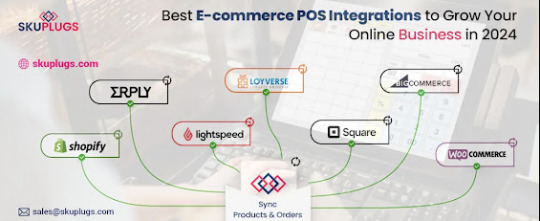
View On WordPress
#eCommerce Integration#eCommerce POS integration#Lightspeed X-Series shopify integration#lightspeed shopify integration#loyverse woocommerce integration
0 notes
Text
Why Enterprise Brands Are Choosing Shopify Over WooCommerce, Magento & BigCommerce: A Data-Driven Analysis
Introduction: The Shift to Shopify
Is your eCommerce platform helping or hindering your business growth? If you're struggling with high maintenance costs, slow performance, or lack of scalability, you're not alone. Over 68% of enterprise brands are migrating from WooCommerce, Magento, and BigCommerce to Shopify. But why is this shift happening?
In this blog, we’ll break down the key reasons why brands are choosing Shopify over other platforms, backed by data and real-world insights. If you're considering a move, OyeCommerz specializes in seamless Shopify migrations and can help you make a hassle-free transition.
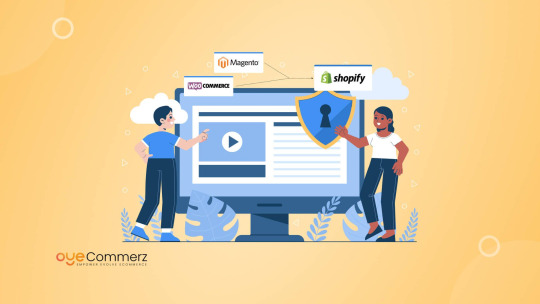
1. Total Cost of Ownership: Shopify Wins
One of the biggest factors in platform selection is the total cost of ownership (TCO). While Magento and BigCommerce often require expensive development resources, Shopify’s predictable pricing and low maintenance make it a clear winner.
WooCommerce: Requires hosting, plugins, security updates, and developer support.
Magento: High licensing fees (for Magento Commerce) and extensive customization costs.
BigCommerce: Transaction fees and pricing tiers limit scalability.
Shopify: All-in-one pricing with hosting, security, and 24/7 support included.
🔗 Related Resource: High Maintenance Costs in Shopware? Here’s Why Shopify is the Cost-Effective Alternative
2. Scalability & Performance: Faster Growth with Shopify
Enterprise brands need platforms that scale effortlessly. Shopify offers better uptime, faster loading speeds, and reliable performance, all without the need for extensive backend management.
Shopify Plus handles millions of transactions per minute without performance issues.
Built-in CDN ensures faster page loading times globally.
Automatic updates mean you’re always running on the latest version.
🔗 Learn More: Shopify Beyond Migration: How to Help Scale Your E-commerce Business
3. Seamless Omnichannel Selling
Unlike WooCommerce and Magento, Shopify provides a native omnichannel experience, allowing brands to sell on social media, marketplaces, and retail locations seamlessly.
Unified inventory management across all sales channels.
Built-in social commerce integration (Instagram, Facebook, TikTok, etc.).
Shopify POS for a connected online and offline retail experience.

4. Security & Compliance: Shopify Takes the Lead
Shopify provides PCI-DSS Level 1 compliance, meaning enterprise-level security is built-in. Magento and WooCommerce, on the other hand, require manual security updates, leaving stores vulnerable.
SSL encryption included in all plans.
Regular automatic updates without downtime.
Fraud analysis & AI-driven security measures.
🔗 Read More: Why Shopify’s Security is Superior for E-commerce Stores
5. Future-Proofing with Shopify’s Composable Commerce
Shopify’s Composable Commerce allows brands to create flexible, API-driven storefronts, ensuring they stay ahead in the ever-changing eCommerce landscape.
Shopify Headless Commerce for customizable front-end experiences.
Seamless integrations with ERP, CRM, and third-party apps.
AI-driven personalization to enhance customer experience.
🔗 Discover More: Why Businesses Migrating from Magento & BigCommerce Should Leverage Shopify Headless Commerce
Conclusion: Shopify is the Future of Enterprise E-commerce
The numbers speak for themselves—brands are choosing Shopify over other platforms because it offers cost efficiency, scalability, security, and future-ready technology. If you're considering migrating, now is the perfect time.
👉 Need expert migration help? OyeCommerz specializes in seamless transitions from WooCommerce, Magento, and BigCommerce to Shopify. Contact us today for a consultation!
0 notes
Text
How the Best Inventory Management Software Can Save Your Business Thousands in 2025
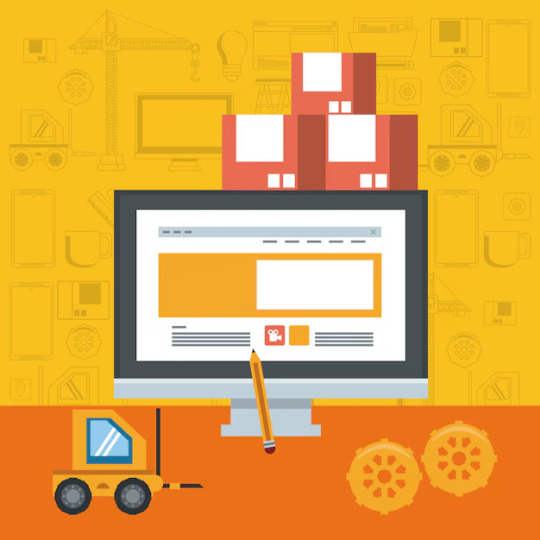
Efficient inventory management is crucial for businesses looking to minimize losses, optimize stock levels, and improve cash flow. However, manual tracking or outdated systems can lead to costly errors, overstocking, stockouts, and revenue loss. Investing in the best inventory management software can save your business thousands by automating stock control, reducing waste, and maximizing efficiency.
In this article, we’ll explore how using advanced inventory management software can help businesses cut costs and improve profitability in 2025.
1. Eliminating Overstocking & Reducing Waste
One of the biggest financial drains on businesses is overstocking. Excess inventory ties up capital, increases storage costs, and leads to product waste, especially for perishable goods.
✅ How the Best Inventory Management Software Helps: ✔ Provides real-time inventory tracking to prevent unnecessary stockpiling ✔ Uses demand forecasting to optimize order quantities ✔ Reduces spoilage and obsolescence by ensuring better stock rotation
💡 Cost Savings: Preventing overstocking can reduce inventory holding costs by 20-30% annually.
2. Preventing Stockouts & Lost Sales
Running out of stock can be just as damaging as overstocking. It leads to missed sales opportunities, customer dissatisfaction, and damaged brand reputation.
✅ How the Best Inventory Management Software Helps: ✔ Sends low-stock alerts and automated reorder notifications ✔ Syncs inventory across multiple sales channels in real-time ✔ Helps maintain safety stock levels to meet customer demand
💡 Cost Savings: Businesses using automated inventory tracking see a 20-25% increase in sales efficiency due to fewer stockouts.
3. Reducing Human Errors & Manual Data Entry Costs
Manual inventory tracking is time-consuming and prone to errors, leading to inaccurate stock counts, misplaced orders, and financial miscalculations.
✅ How the Best Inventory Management Software Helps: ✔ Automates inventory updates, eliminating the risk of human errors ✔ Uses barcode and RFID scanning for accurate stock recording ✔ Integrates with accounting and POS systems to maintain precise financial records
💡 Cost Savings: Businesses can cut 75-80% of administrative labor costs by automating inventory management.
4. Optimizing Supply Chain & Vendor Management
Poor supplier coordination leads to delays, excess orders, and increased procurement costs. An effective inventory system improves supplier relationships and streamlines procurement.
✅ How the Best Inventory Management Software Helps: ✔ Tracks supplier performance and delivery times ✔ Automates purchase order creation and vendor communications ✔ Provides insights into cost-effective bulk ordering opportunities
💡 Cost Savings: Improved supplier management can lead to 5-15% cost reductions in procurement expenses.
5. Enhancing Multi-Channel Inventory Synchronization
For businesses selling through multiple platforms (eCommerce, retail, wholesale), syncing inventory across channels is essential to prevent mismanagement and over-ordering.
✅ How the Best Inventory Management Software Helps: ✔ Unifies inventory data across online stores, warehouses, and physical locations ✔ Ensures real-time stock updates, preventing duplicate or missed orders ✔ Integrates with platforms like Shopify, Amazon, and QuickBooks for seamless operations
💡 Cost Savings: Multi-channel inventory integration can boost revenue by up to 30% by preventing sales loss due to inaccurate stock availability.
Conclusion: Why You Need the Best Inventory Management Software in 2025
With increasing business complexities and rising operational costs, using the best inventory management software is no longer optional—it’s essential. By automating inventory tracking, optimizing stock levels, and reducing waste, businesses can save thousands of dollars annually while boosting efficiency and profitability.
Looking for the best inventory management solution? Check out our expert guide here! 🚀
0 notes
Text
Shopify development company
Why develop store with Shopify?

Shopify ecommerce encompasses a wide range of powerful features such as unlimited products, multiple sales channels, fraud analysis, discount codes, integrated POS, financial reports, and a thriving community.
In addition, you will receive an integrated eCommerce platform that allows for web hosting, simple admin management, and an SSL-powered store at a low monthly cost.
As a leading Shopify development company in India, we specialize in designing and developing highly personalized Shopify stores for businesses of all sizes. At eCodeSoft Solutions, we use the best coding practices to create dependable and mobile-friendly Shopify e-Commerce stores.
For more information, please visit: https://ecodesoft.com/shopify-development/
#shopify development company#shopify experts#shopify ecommerce development#web development#software development
0 notes